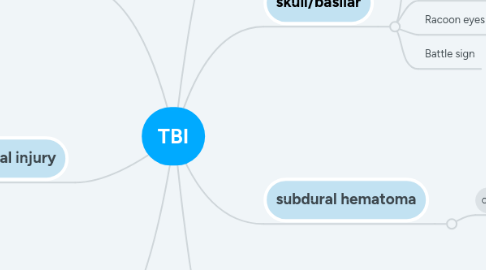TBI
by Kacy Sauvola


1. Contusion
1.1. bruising and damage in a specific areas
1.2. symptoms & recovery depend on amt. of damage/cerebral edema
1.3. similar s/s of concussion but more localized and could be moderate -> severe
1.4. usually not seen on the first CT obtained after trauma (seen in follow up scans)
2. diffuse axonal injury
2.1. widespread axon damage in the brain
2.2. severe injury, poor prognosis
2.3. no lucid interval, prolonged traumatic coma
2.4. posturing
3. epidural hematoma
3.1. blood collection between skull/dura
3.2. usually arterial
3.3. brief loss of consciousness but will return to lucid state
3.4. increases ICP, which reduces LOC
3.5. emergency
3.6. conservative t/x, reduce ICP, remove clot, stop bleeding, burr hole/craniotomy
4. skull/basilar
4.1. bleeding from nose/pharynx/ears
4.2. CSF leak (halo sign)
4.3. Racoon eyes
4.4. Battle sign
5. Concussion (Mild traumatic brain injury)
5.1. temporary loss of Neuro function but no apparent structural damage
5.2. will likely be sent home
5.2.1. report immediately any changes in LOC, difficulty in awakening, increasing lethargy, dizziness, confusion, irritability/anxiety, difficulty speaking/moving, severe H/A, projectile vomiting
5.3. S/S: emotional lability, sleeping more/less, H/A, concentration difficulty (symptoms increase w/ activity)
6. subdural hematoma
6.1. collection of blood between dura and brain
6.1.1. acute
6.1.1.1. s/s 24-48 hours
6.1.2. subacute
6.1.2.1. s/s 48h-2 weeks
6.1.2.1.1. control ICP, OBS, FFP/platelets, surgical decompression
6.1.2.1.2. poor prognosis
6.1.3. chronic
6.1.3.1. weeks-months
6.1.3.1.1. causative injury may be minor & forgotten
6.1.3.1.2. clinical s/s may fluctuate
6.1.3.1.3. t/x obs, evacuation of clot, control ICP

